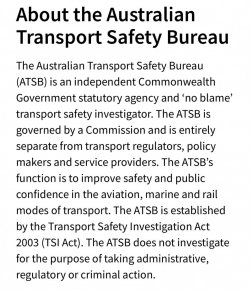Leave the ATSB for the finger pointing.
Depends on the operator really and how they deal with it. A smaller general aviation or turboprop operator might deal with such finger pointing a bit different vs say RPT carrier with big training/HR machines behind them. The finger pointing, blaming and bad handling stuff I’ve heard about is in smaller GA outfits.
Depends on the operator really and how they deal with it. A smaller general aviation or turboprop operator might deal with such finger pointing a bit different vs say RPT carrier with big training/HR machines behind them. The finger pointing, blaming and bad handling stuff I’ve heard about is in smaller GA outfits.















